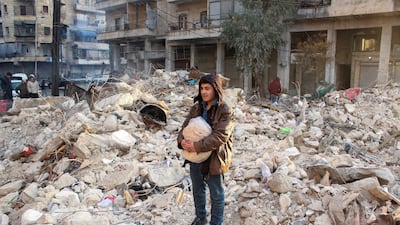The world’s screens have been filled this week with images of homes, schools and business in Turkey and Syria being reduced to rubble. Earthquakes may be beyond our control but Monday’s disaster shines a new light on the continuing, man-made suffering of Syria’s people.
Over the past 12 years of war, large parts of the country have been left in much the same kind of ruin that was caused by this week’s 7.8-magnitude tremor. Lost lives, devastated cities, fractured families and smashed infrastructure came to characterise one of the Arab world’s oldest and most beautiful countries.
Those in north-west Syria left homeless by the earthquake now join the thousands of people internally displaced by the civil war and the estimated 5.6 million refugees – including more than 2.6 million children – scattered across Egypt, Iraq, Jordan, Lebanon and Turkey.
Most of these refugees are now measuring their time in exile not in months, but in years – a reflection of the stagnant political process surrounding the Syrian conflict. No consensus exists on how to end the country’s divisions or reach a settlement its people can accept.
This deadlock and lack of international co-operation can be seen in the difficulties of getting aid to the estimated 4.1 million civilians living in north-west Syria – at least half of whom have been displaced at least once since the start of the conflict.

The Bab Al Hawa crossing with Turkey remains the only route for international aid to reach people in this part of Syria. That this lifeline – through which thousands of aid lorries passed last year – has now reportedly been damaged by the earthquake is a cause for grave concern. Other crossings that could carry emergency help remain closed amid political divisions at the UN.
The length and intractability of the Syrian conflict has allowed war fatigue to set in, both in terms of media coverage and at the diplomatic level. Other wars, such as the invasion of Ukraine, have emerged to dominate the headlines.
One effect of this earthquake, in all its profound cruelty, has been to mobilise the international community. Forty-five countries, including the UAE, have sent aid, equipment and personnel to Turkey, which has suffered more than 4,500 deaths so far.
The Emirates is among the countries also sending help to Syria but the challenges of distributing emergency aid in a divided nation highlights the need to revive the diplomatic process. Time is of the essence here, as many people remain trapped under collapsed buildings and the harsh winter hampers rescue efforts.
Syria’s people deserve better than years of hardship and exile. Although this natural disaster may have turned the world’s attention on the country again, this focus must be translated into efforts to revive the moribund process of resolving the conflict and finally giving Syrians a country they can return to and something like a normal life.


